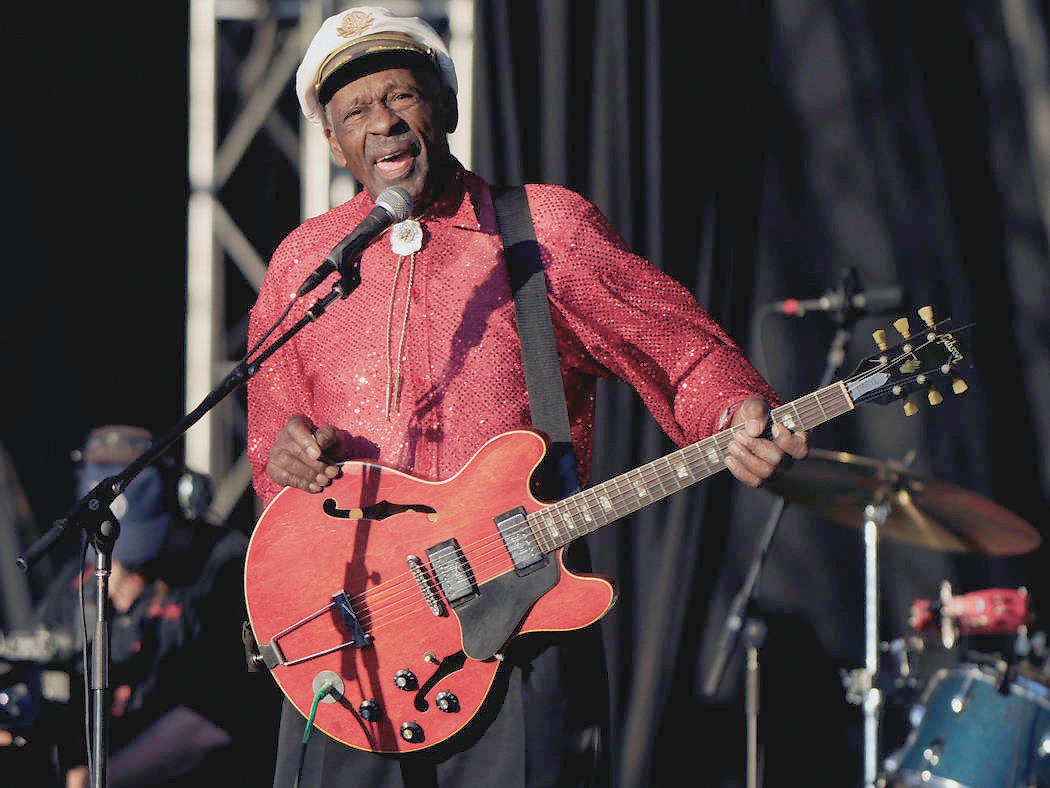

MISSOURI: Chuck Berry, who duck-walked his way into the pantheon of rock ‘n’ roll pioneers as one of its most influential guitarists and lyricists, creating raucous anthems that defined the genre’s sound and heartbeat, died on Saturday at his Missouri home. He was 90.
Police in St Charles County, outside St Louis, said they were called to Berry’s home by a caretaker and found him unresponsive. Efforts to revive him failed and he was pronounced dead at 1:26 pm local time.
Considered one of the founding fathers of rock ‘n’ roll, Charles Edward Anderson Berry was present at its infancy in the 1950s and emerged as its first star guitarist and songwriter — a nearly 30-year-old black performer whose style electrified young white audiences and was emulated by white performers who came to dominate American popular music.
Although Elvis Presley was called the king of rock ‘n’ roll, that crown would have fit just as well on Berry’s own carefully sculpted pompadour.
Berry hits such as Johnny B Goode, Roll Over Beethoven, Sweet Little Sixteen, Maybellene and Memphis melded elements of blues, rockabilly and jazz into some of the most timeless pop songs of the 20th century.
He was a monumental influence on just about any kid who picked up a guitar with rock star aspirations — Keith Richards, Paul McCartney, John Lennon and Bruce Springsteen among them.
Bob Dylan called Berry “the Shakespeare of rock ‘n’ roll,” and he was one of the first popular acts to write as well as perform his own songs. They focused on youth, romance, cars and good times, with lyrics that were complex, humorous and sometimes a little raunchy.
Both the Beatles and the Rolling Stones, as well as the Beach Boys and scores of other acts — even Elvis — covered Berry’s songs.
“If you tried to give rock ‘n’ roll another name,” Lennon once said, “you might call it ‘Chuck Berry’.”
Paying tribute to Berry on Twitter on Saturday, Springsteen called him “rock’s greatest practitioner, guitarist, and the greatest pure rock ‘n’ roll writer who ever lived.” Rolling Stones singer Mick Jagger tweeted: “Chuck you were amazing & your music is engraved inside us forever.”
When Richards inducted Berry into the Rock and Roll Hall of Fame in 1986, he said: “It’s very difficult for me to talk about Chuck Berry because I’ve lifted every lick he ever played. This is the gentleman who started it all.”
His death came five months after Berry announced plans to release his first album of new music in 38 years some time in 2017 — a collection of mostly original material recorded and produced by Berry, titled Chuck and dedicated to his wife of 68 years, Themetta “Toddy” Berry.
“My darlin’ I’m growing old! I’ve worked on this record for a long time. Now I can hang up my shoes,” Berry wrote in a statement for the occasion, coinciding with his 90th birthday.
Berry listed T-Bone Walker, Carl Hogan of Louis Jordan’s band and Charlie Christian from Benny Goodman’s band among his guitar influences, but his lyrical style was all his own.
Punchy wordplay and youth-oriented subject matter earned him the nickname “the eternal teenager” early in his career. His legacy was tarnished, however, by his reputation as a prickly penny-pincher and various run-ins with the law, including sex-related offences after he achieved stardom.
Berry came along at a time when much of the United States remained racially segregated, but it was hard for young audiences of any colour to resist a performer who delivered such a powerful beat with so much energy and showmanship.
Berry said he performed his signature bent-knee, head-bobbing “duck walk” across more than 4,000 concert stages. He said he invented the move as a child in order to make his mother laugh as he chased a ball under a table.
Some critics suggested it was his former pianist, Johnnie Johnson, who composed the tunes while Berry only penned the lyrics. Johnson sued Berry in 2000 for song royalties, saying they were equal collaborators on many of the hits, but the case was dismissed on grounds that the statute of limitations had expired.
It was with Johnson that Berry first made his mark, playing at black clubs in the St Louis area at the musically ripe age of 27. Berry started out filling in with Johnson’s group, known as Sir John’s Trio, in 1953, and Johnson eventually acknowledged Berry’s talent, charisma and business acumen by allowing the group to evolve into the Chuck Berry Trio.
At the suggestion of blues legend Muddy Waters, Berry auditioned for Chess Records, the white-owned Chicago label that put out scores of blues hits. The result was the rockabilly tune Ida Red, which became a hit after it was retitled Maybellene and discovered by white audiences.
When the record came out, Berry said he was stunned to see that pioneering rock ‘n’ roll disc jockey Alan Freed and another man he had never met, Russ Fratto, were listed as co-writers of Maybellene.
The shared credits deprived him of some royalty payments, but Berry dismissed it at the time as part of the “payola” system that determined which records got radio play in the 1950s. He later regained all the rights to his compositions. — Reuters
Oman Observer is now on the WhatsApp channel. Click here



